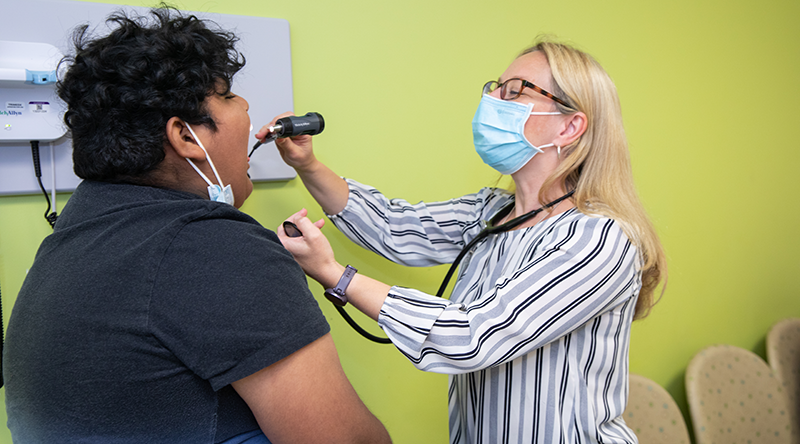
Eryk Serrano, 11, gets a back-to-school checkup with Taralyn Cronin, DO, a sleep medicine physician at Yale New Haven Children’s Hospital who sees pediatric patients with sleep issues at the Pediatric Specialty Center in Trumbull.
Make the grade with healthy back-to-school sleep habits
Kids tend to stay up later and sleep in during their summer break, as schedules are typically more relaxed than during the school year. But does the later morning wake-up call spell trouble for kids once the back-to-school alarm clock rings?
There are several reasons why kids stay up later in the summer. Light plays a key role, as it suppresses the body’s production of melatonin, a hormone that tells your body when it is time to go to sleep. Longer days mean more exposure to natural light, and more time in front of phones, tablets and gaming consoles ups the exposure to another type of light – blue light. Reduced melatonin from both disrupts the sleep-wake cycle.
Craig Canapari, MD, director of the Yale New Haven Children’s Hospital Pediatric Sleep Center who sees patients at the Pediatric Specialty Center in Trumbull, said it’s not too late to get children back into healthy sleep patterns as the new school year gets underway.
Helping kids sleep
Parents can help improve their child’s sleep schedules at two times during the day: bedtime and wake time. For nighttime, Dr. Canapari encourages families to talk about the importance of sleep and the impact electronics can have. If parents want to set limits on screen time, they should set a good example.
“If you’re sitting, scrolling through Twitter anxiously at nighttime in your bedroom, your kids are going to look at you and say, ‘Well, you’re doing it,’ and they’re not wrong. For your sleep, reducing that will be helpful as well,” Dr. Canapari said.
If kids need to use a laptop or tablet for schoolwork, blue-blocking glasses can help reduce that light. Kids should also avoid snacking at night, which can be a signal to the body that it’s time to wake up.
Recommended sleep schedules
Try to keep kids’ sleep schedules consistent for the new school year. On days when they’re home, teens can sleep in up to two hours later than they would on a regular school day. But any more than that can impact their sleep patterns.
In general, teens should get between eight and nine hours of sleep per night. Middle-school-aged kids need between nine and 11 hours of sleep; kids under 10 need around 10 hours of sleep; and preschoolers need between 11 and 12 hours of sleep.
Dr. Canapari said parents shouldn’t expect perfection. Instead, they should strive to improve sleep schedules gradually, because even an extra 30 minutes of sleep can have a positive impact on students.
“Sleep is like eating and breathing. It’s critical for functioning and if you explain this to your child in language that they understand, you’re going to have a much greater chance of succeeding,” he said.
The sleep doctor is in
If your child is struggling to wake up in the morning, stay asleep at night, or is dealing with anxiety or other issues, it may be time to consult a sleep specialist.
“Sleep is vitally important, and there are a lot of things that can affect it,” said Taralyn Cronin, DO, a sleep medicine physician at Yale New Haven Children’s Hospital who sees pediatric patients at the Pediatric Specialty Center in Trumbull.
Common sleep problems
“In the younger-age group, it’s typically a difficulty falling asleep, staying asleep – what we call behavioral insomnia of childhood – that we see,” Dr. Cronin said. “That includes not wanting to go to sleep without parents lying down with them, wandering out of their beds into their parents’ rooms, and waking up multiple times throughout the night.
“Other concerns include snoring, restlessness and complaints of leg pains,” Dr. Cronin said. “When children get older – especially teenagers – they may have trouble falling asleep when they want or have trouble getting out of bed in the morning. We are also seeing a lot of teenagers with anxiety and depression, and all of those things can affect sleep.”
Digging deeper
Dr. Cronin said examining a child’s sleep patterns is one of the first places she starts, to find out if the child is going to bed too late, or too early, when the child is not sleepy.
While a sleep study can’t help with insomnia, it can help sleep specialists pinpoint disorders affecting sleep, such as restless leg syndrome, which causes periodic limb movements, or sleep apnea, a disorder that affects breathing during sleep. Pediatric sleep studies are available at Bridgeport Hospital as well as in New Haven and Greenwich.
Sleep medicine specialists from Yale New Haven Children’s Hospital are available for consultation and treatment at the Pediatric Specialty Centers throughout Yale New Haven Health, including Trumbull, at 5520 Park Ave.

